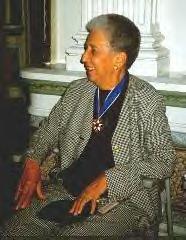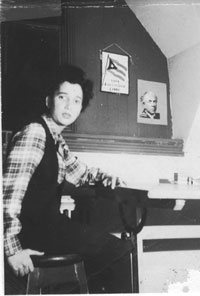Note: See the very end of this article about former Secretary of State Norma Burgos’ “Puerto Rican citizenship.” What are the implications of this for the right of Stateside Puerto Ricans being able to vote in a plebiscite on the political status of Puerto Rico? Interesting.
—Angelo
PUERTO RICO
Court win fuels Puerto Rican citizenship debate
After a long battle, the elder statesman of Puerto Rico’s independence movement finally has what he wanted: citizenship
BY FRANCES ROBLES
Miami Herald (July 14, 2007)
MAYAGUEZ, Puerto Rico — The seeds of Juan Mari Brás’ quixotic patriotism were planted when his parents draped a Puerto Rican flag over his crib.
Those seeds flourished 13 years ago, when the elder statesman of Puerto Rico’s independence movement renounced his U.S. citizenship in an effort to be officially recognized as a Puerto Rican. He’s 79 now, and after a 60-year anti-colonial crusade, he has something new to adorn his surroundings: a certificate of Puerto Rican citizenship.
He is the first Puerto Rican in history to have one. And as the U.S. Congress considers Puerto Rico’s status, Mari Brás’ newfound and hard-fought citizenship has refueled the heated debate about what it means to be Puerto Rican.
The certificate was issued in October after Mari Brás successfully sued for the right to vote in local elections. Last month, the Secretary of State’s Office here offered citizenship to eligible islanders. About 450 have requested certificates, and legislators are drafting bills to codify the process of obtaining them.
The tangible value of the certificates is in doubt, even among some of Marí Brás followers.
”With this certificate, can I travel from here to some other country?” asked independence party legislator Víctor García San Inocencio. “When I come back, will Homeland Security let me in?” The answers: no and no.
For Mari Brás, the citizenship certificate is more legal test than meaningful evidence of nationality. He said his win is important because it marks the first time the government here has recognized a national identity not tied to the United States. But he shrugs off the significance of his long court battle, recognizing that while it may have been the most important achievement Puerto Rico’s tiny independence movement has seen in years, it is a far cry from the sovereignty he craves.
”Biologists experiment with plants and animals and chemists do so with elements,” he said in a recent interview at his office at the Eugenio María de Hostos Law School in Mayagüez. “Since I am a lawyer, I experiment with the law. The certificate is an achievement, but it’s not the independence of Puerto Rico.”
When Mari Brás was born to a deeply political Mayagüez family, the U.S. military had seized Puerto Rico from Spain barely 30 years earlier. People like nationalist leader Pedro Albizu Campos were frequent dinner guests at his uncle’s house next door.
”Back then, we thought independence would happen the day after next,” he said. “We never thought we would remain the most important colony of the most important empire.”
His father took him to political events, and he founded an independence movement in high school. It became a passion that got him jailed seven times, kicked out of law school and a heart attack at 36.
Mari Brás graduated from American University Law School in Washington. As a lawyer, he took on controversial cases such as the independence activists who opened fire on the U.S. House of Representatives. He founded the Puerto Rican Socialist Party and ran a spirited campaign for governor in 1976 until his son was murdered, a death Mari Brás blames on the CIA.
A Marxist with close ties to Havana, he was disbarred from practicing in federal court when he skipped a client’s appearance to attend a conference in Cuba.
But after decades of sometimes violent activism, even now the independence movement gets only about 4 percent of the popular vote. The vast majority of Puerto Rico’s 4 million people are split between wanting to become the 51st state and keeping some form of its current commonwealth status.
In a mission to prove Puerto Ricans had a separate national identity, Mari Brás in 1994 went to the American embassy in Caracas and renounced his U.S. citizenship. When he returned to Puerto Rico, a local statehood activist sued him, arguing that Mari Brás no longer had a right to vote in local elections. Puerto Rico’s electoral law says that only U.S. citizens can cast ballots.
”I wanted to see if in Puerto Rico you could continue breathing without being a U.S. citizen,” he said.
The case made the Puerto Rican Supreme Court, and, last fall, Mari Brás won.
”It’s extraordinary,” said Michael Ratner, president of the Center for Constitutional Rights, a New York group that has represented Puerto Rico’s independence activists. “He has been after this for 30 or 40 years. The next step is people will demand passports. What other things can flow from there?”
The Popular Democratic Party, which seeks more autonomy for Puerto Rico while keeping the island’s current relationship with the United States, agrees.
”An empty wallet does not have everything a full wallet has,” said legislator Charlie Hernández, who has submitted a bill to codify the citizenship process.
Puerto Rico’s New Progressive Party (PNP), which supports statehood, is vehemently against the citizenship plan, calling it a useless and illegal residency certificate. It also alleges that current Secretary of State Fernando Bonilla, of the ruling Popular Democratic Party, agreed to go along with it in order to attract votes within the independence movement.
In a statement, Bonilla said he offered the certificate to obey the constitution and the court decision. He stressed that it doesn’t replace the U.S. passport.
‘I understand Juan Mari Brás’ purpose and respect it, but Puerto Rican citizenship does not exist,” said PNP Sen. Norma Burgos, a former secretary of state who once denied Mari Brás’ petition for citizenship.
To prove her point, Burgos, who was born in Chicago and moved to Puerto Rico when she was 5, asked for citizenship. Under rules that the Secretary of State drafted after Mari Brás’ court victory, she did not qualify.
”Was the Secretary of State going to tell me, Norma Burgos, ex-secretary of state, ex-lieutenant governor, and sitting senator, that I am not Puerto Rican?” she said.
Bonilla redrafted the requirements to include Burgos — and lots of other people. Now, if you live in Puerto Rico and one of your parents was born here, you qualify. U.S. citizens who have lived here more than a year are also eligible.
NILP 3
National Institute for Latino Policy
101 Avenue of the Americas, Suite 313
New York, NY 10013
www.latinopolicy.org
Angelo Falcón, President and Founder
212-334-5722 Fax: 917-677-8593
afalcon@latinopolicy.org

